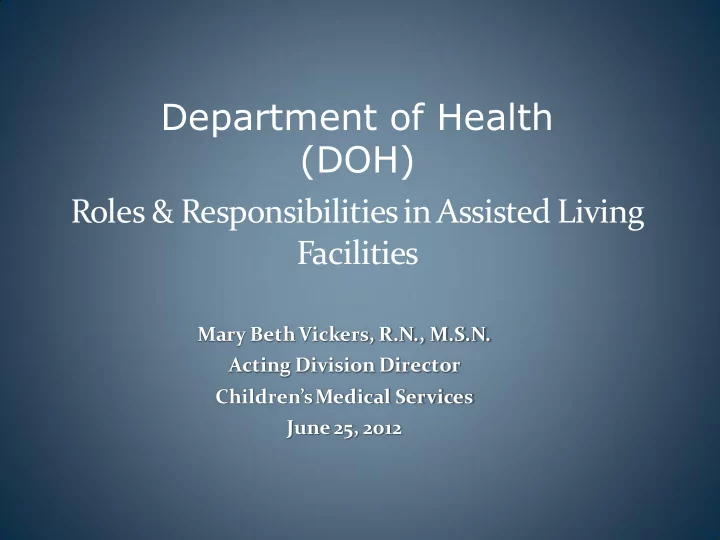

Department of Health (DOH) Roles & Responsibilities in Assisted Living Facilities Mary Beth Vickers, R.N., M.S.N. Acting Division Director Children’s Medical Services June 25, 2012
DOH Inspection Activities Onsite Sewage Treatment Systems and Disposal (Septic System) Limited Use Public Water Systems-Systems that serve up to 24 people. Regulation of Pools if more than 7 residents Group Care-Safety, Health and Sanitation of the Physical Site Food Hygiene Biomedical Waste (does not apply to all ALFs)
Inspection Activities-New ALF OSTDS If ALF has a Septic System, permitting requirements for the system may include 3 inspections: Site evaluation, Construction inspection and Final Cover Inspection. These initial inspections are performed during the construction phase. If ALF has 11 or more residents, an annual commercial septic operating permit is required. This includes an annual operating permit inspection to assess the conditions of the system.
Inspection Activities-New ALF Wells and Pools If ALF has a Well , the inspection must include: Well Installation and Equipment Inspection Well Equipment-inspection completed annually each year thereafter Water Sampling for coliform bacteria initially and quarterly thereafter Initial inspections are performed during the construction phase If the ALF has a Pool – The local county or city building department has construction inspection responsibilities After the pool construction is approved, the DOH will perform inspections twice annually thereafter
Inspection Activities-New ALF Food Hygiene and Physical Site Pre-Opening Inspection is completed, and once inspection results are satisfactory, the ALF will be inspected based on a routine schedule as follows: Inspection frequency varies depending on the size of the facility and date ALF opened 10 or fewer residents: Annually If the ALF opened prior to 1/20/08, and has 11-24 residents- Annually If ALF opened on or after 1/20/08 and has 11 or more residents or opened prior to 1/20/08 and has 25 or more residents-annual inspection of physical site and quarterly for food hygiene
Inspection Activities-New ALF Biomedical Waste If the ALF generates biomedical waste through skilled nursing services or employee medical services, an inspection is completed after the application for permit is received-once inspection results are satisfactory, the ALF will be inspected based on a routine schedule as follows: If the ALF generates less than 25 pounds of waste monthly- inspected once every three years If the ALF generates 25 pounds or more of waste monthly- inspected annually Counties may choose to share in this component of the inspection process Note: Biomedical waste does not regulate waste generated from residents doing self-injections.
Enforcement-Current Practice Enforcement activities may include the following : Re-inspection including compliance related education to staff Fines Revocation of appropriate program permit (food hygiene, well, biomedical waste)
Multiple Regulators Currently DOH is operating under an Interagency Agreement with AHCA (2002) to ensure there is no duplication of ALF inspection activities. DOH provided training for AHCA staff in August, 2011 to provide field staff with a better understanding of the DOH Regulatory role in an effort to: Reduce duplication of inspection activities between AHCA and DOH Increase appropriate referrals from AHCA to the DOH Inspection staff
Questions
Recommend
More recommend